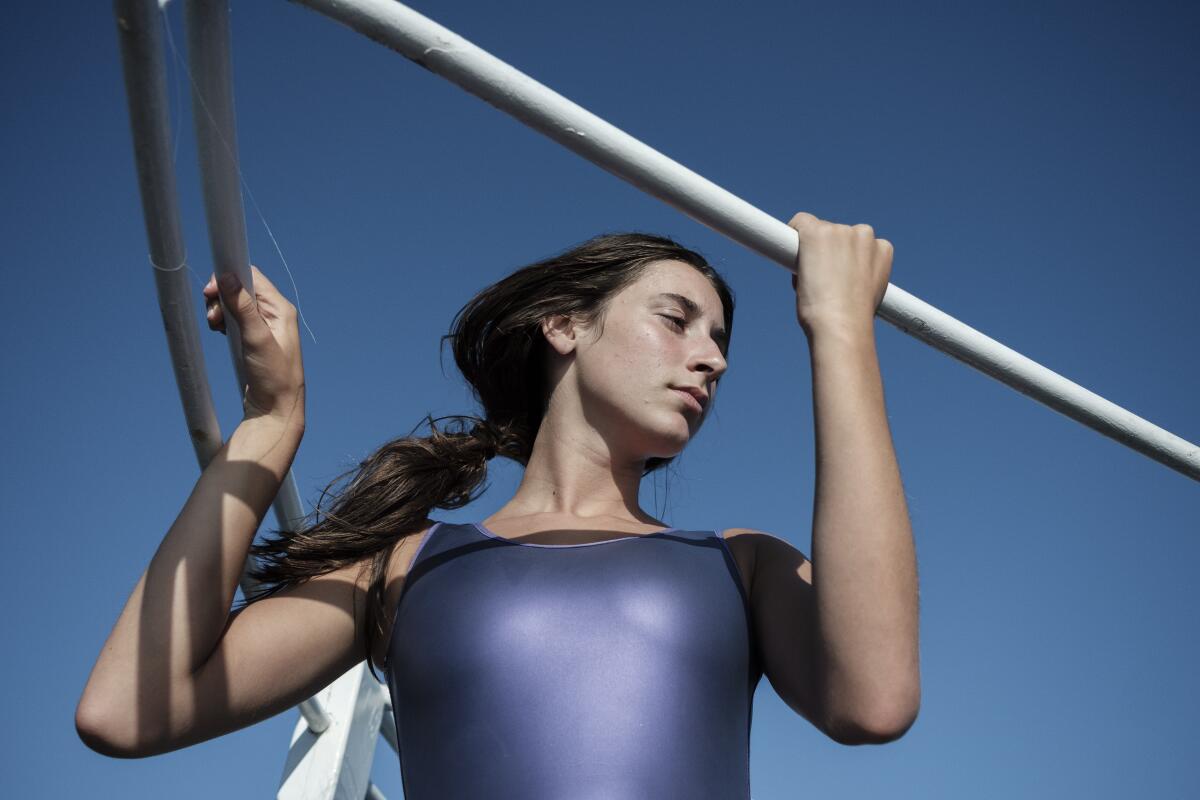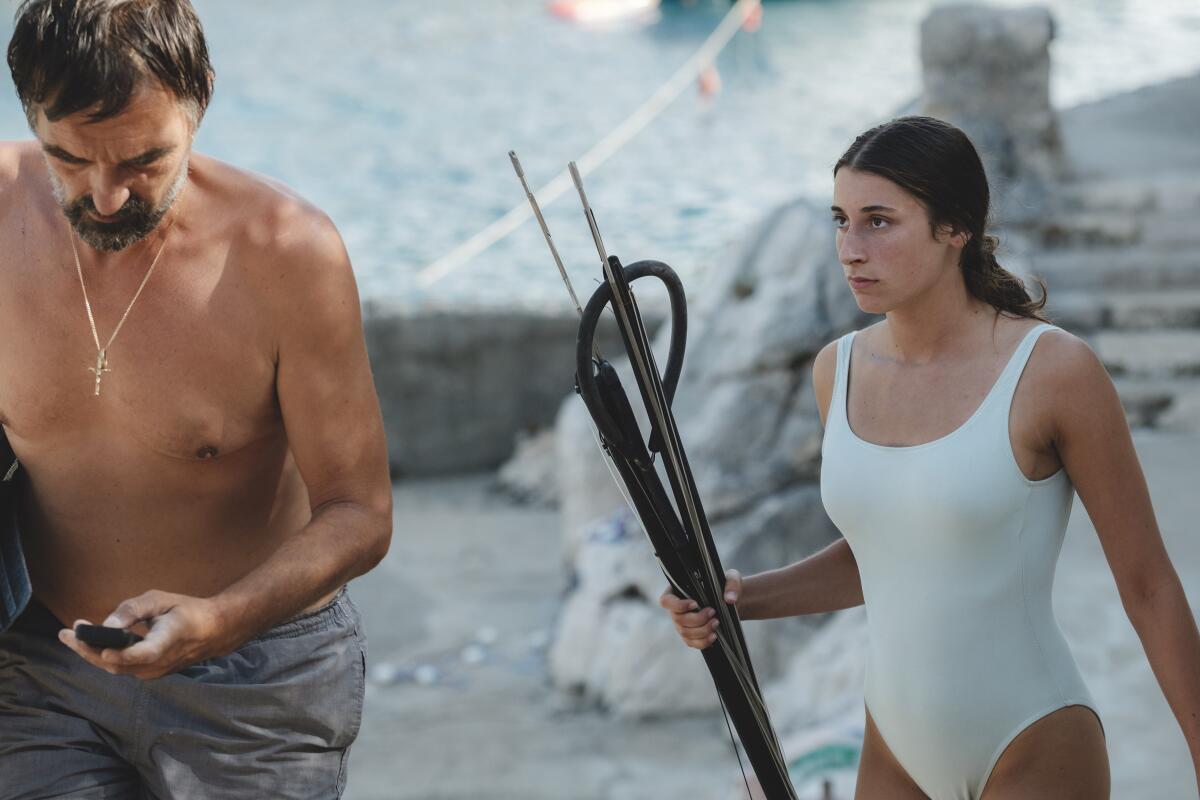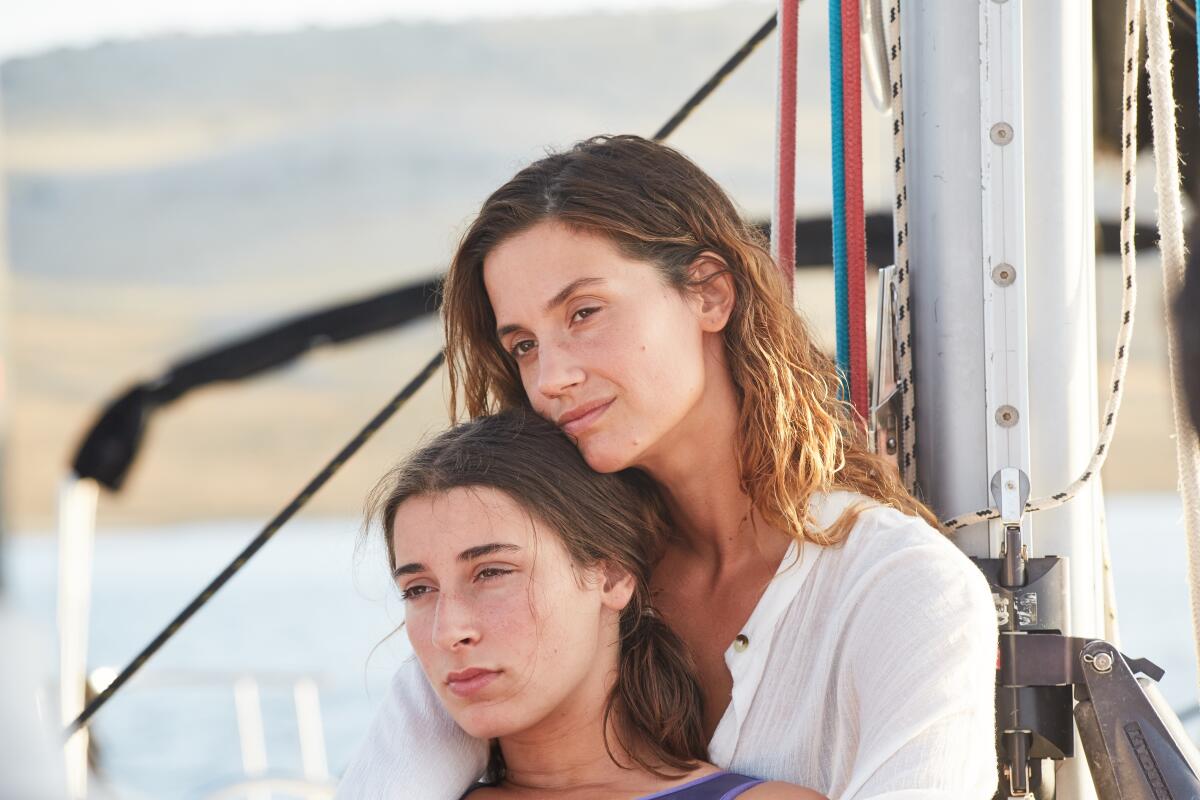Review: The superbly tense ‘Murina’ gives us a coming-of-age drama once more, with eeling

- Share via
“Murina,” an impressively tense, psychologically astute drama from Croatia, opens with a glimpse of Chekhov’s spear gun, a device not uncommon in tales of underwater peril.
Julija (Gracija Filipović), a dark-haired 17-year-old who’s spent most of her life swimming and snorkeling off the Adriatic coast, is making a routine dive with her fisherman father, Ante (Leon Lučev), hunting for the moray eels that are the region’s signature delicacy (and which are referenced by the movie’s title). Out come the harpoons and flashlights, illuminating a dark blue world whose seen and unseen wonders, and even its occasional terrors, are for Julija a much-needed respite from the oppressiveness of her life above the surface.
You could think of this particular coming-of-age story as a sly reversal of “The Little Mermaid,” in which a very human teenager seeks to escape the tiny piece of dry land she calls home. Really, she needs to get away from Ante, a father so bitterly controlling that you may fantasize about seeing him on the receiving end of that harpoon, or at least a well-earned slap. Large of ego and short of temper, Ante barks orders at Julija and appraises her with a contemptuous stare, exhibiting some pride at her prowess underwater but also a growing resentment of the independent-minded woman she’s becoming. His bad vibes and hard-to-fathom cruelty are the drivers of this movie’s unflagging tension; they also speak to a larger tragedy, at once distant and ongoing, that has engulfed more than one victim.
For your safety
The Times is committed to reviewing theatrical film releases during the COVID-19 pandemic. Because moviegoing carries risks during this time, we remind readers to follow health and safety guidelines as outlined by the CDC and local health officials.
A steadily gripping feature debut from the Croatian writer-director Antoneta Alamat Kusijanović (who won the Caméra d’Or for best first film at Cannes last year), “Murina” takes place over a fraught few days that dangle a possible liberation from that tragedy.
Javier (a fine Cliff Curtis), a wealthy businessman and an old friend and colleague of Ante’s, has come to stay at their island home for a few days, bringing an entourage that quickly thins out as the ostensible reason for his visit becomes apparent. Ante, trying to rid himself of this cursed land, has a none-too-promising business proposition in mind. Javier, with his jovial backslaps, companionable smiles and occasional attempts to mollify the short-fused Ante, pays occasional attention but seems rather more interested in the women in their midst.

That certainly includes Julija’s beautiful, long-suffering mother, Nela (Danica Čurčić), her radiance undimmed by years spent trying to maintain a fragile peace between her husband and daughter. Nela’s kindness is both a balm and frustration to Julija, who can’t help but resent her for letting Ante drag them all under. Once upon a time, it’s revealed, Javier might have secured Nela’s freedom. Now Julija wonders if he might secure hers, opening the door to future dreams — of studies and opportunities, of a man’s love or even a replacement father figure — that she’s never been able to seriously entertain, judging by how Ante dissuades her from even hanging out with the carefree youths sunbathing just past their property.
At times overpowering in its sun-drenched sense of place, “Murina” reveals each corner of this private world to us with a cool, dispassionate gaze. The water’s surface glints and undulates with sinister beauty in the movie’s wide-screen images (shot by the great French cinematographer Hélène Louvart, who filmed a Greek island holiday from a similarly anti-touristic perspective in “The Lost Daughter”). Much of the story unfolds aboard a boat, sailing through waters that Ante, Nela and Julija know all too well even as it steers them into dangerously new emotional territory. At times the movie seems to glance in the direction of Roman Polanski’s “Knife in the Water,” another incisive psychological thriller about boating, foreboding and shifting geometries of desire.

On paper, the story’s relationships may seem a touch diagrammatic, particularly the way Javier represents something different, if equally tantalizing, to each of his three hosts (Kusijanović wrote the script with Frank Graziano). But up until the final scenes, when every tension flares unambiguously into the open, Kusijanović assuredly avoids the obvious, instead telling her story with deft, implicative strokes: meaningful glances, offhand dialogue and insinuating body language.
The tightly wound physicality of Lučev’s literally upping-the-Ante performance — the menace compacted into his dad-bod frame, the unhesitating way he hurls Julija off the side of their boat in response to a perceived slight — implies a history of perhaps physical and certainly emotional abuse.
Julija has long bitten her tongue in response, and Filipović’s intelligent, watchful performance is a study in quiet defiance giving way, at last, to something more. Her dream of escape may well be a delusion; Javier, for all the promise he represents, is at best a knight in tarnished armor, as well as a man with burdens and anxieties of his own. But it’s a dream that Kusijanovic embraces alongside her heroine, notably in a sequence of Julija swimming in open water, the camera bobbing gently in front of her for a few moments before rising to a breathtaking bird’s-eye view. It’s a bracing image of freedom in a world that, even if only for a few moments, finally feels like paradise.
‘Murina’
In Croatian and English dialogue with English subtitles
Not rated
Running time: 1 hour, 36 minutes
Playing: Starts July 15 at Laemmle Monica Film Center, Santa Monica
More to Read
Only good movies
Get the Indie Focus newsletter, Mark Olsen's weekly guide to the world of cinema.
You may occasionally receive promotional content from the Los Angeles Times.











